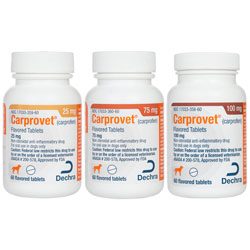Save on All Your Summer Essentials: From Calming Products to Flea & Tick Solutions and More!
Carprofen (generic) Flavored Tablets
SKU : 296025-EA_-RX

Price: $0.69
Save 15% on your first Autoship order
+ Save on each recurring order!
+ Save on each recurring order!
Veterinarian Prescription (Rx) Required
Free Shipping on orders over $75Low Price Match Guarantee
- Compares to Rimadyl
- Non-steroidal anti-inflammatory drug, for oral use in dogs only
- Used for the relief of pain and inflammation associated with osteoarthritis and for the control of postoperative pain associated with soft tissue and orthopedic surgeries in dogs
Brands may vary!
How to Order Prescriptions
The recommended dosage for oral administration to dogs is 1 mg/lb of body weight twice daily. Carprofen Flavored Tablets are scored, and dosage should be calculated in half-tablet increments. Tablets can be halved by placing the tablet on a hard surface and pressing down on both sides of the score. Carprofen Flavored Tablets are palatable and willingly consumed by most dogs when offered by the owner. Therefore, they may be fed by hand or placed on food. Care should be taken to ensure that the dog consumes the complete dose.
For use in dogs only. Do not use in cats.
Description
Carprofen Flavored Tablets (compares to Rimadyl) are used for the relief of pain and inflammation associated with osteoarthritis and for the control of postoperative pain associated with soft tissue and orthopedic surgeries in dogs. Carprofen Flavored Tablets contain carprofen, a non-steroidal anti-inflammatory drug (NSAID).The recommended dosage for oral administration to dogs is 1 mg/lb of body weight twice daily. Carprofen Flavored Tablets are scored, and dosage should be calculated in half-tablet increments. Tablets can be halved by placing the tablet on a hard surface and pressing down on both sides of the score. Carprofen Flavored Tablets are palatable and willingly consumed by most dogs when offered by the owner. Therefore, they may be fed by hand or placed on food. Care should be taken to ensure that the dog consumes the complete dose.
Precautions
Carprofen should not be used in dogs exhibiting previous hypersensitivity to carprofen.For use in dogs only. Do not use in cats.
What is Carprofen?
Carprofen is a non-steroidal anti-inflammatory drug (NSAID) that is used to reduce pain and in inflammation (soreness) due to osteoarthritis and pain following surgery in dogs. Carprofen is a prescription drug for dogs. It is available as a tablet and is given to dogs by mouth. Osteoarthritis (OA) is a painful condition caused by “wear and tear” of cartilage and other parts of the joints that may result in the following changes or signs in your dog:- Limping or lameness
- Decreased activity or exercise (reluctance to stand, climb, stairs, jump or run, or difficulty in performing these activities)
- Stiffness or decreased movement of joints
What kind of results can I expect when my dog is on Carprofen?
While Carprofen is not a cure for osteoarthritis, it can relieve the pain and inflammation of OA and improve your dog's mobility.- Response varies from dog to dog but can be quite dramatic
- In most dogs, improvement can be seen in a matter of days.
- If Carprofen is discontinued or not given as directed, your dog's pain and inflammation may come back.
Who should not take Carprofen?
Your dog should not be given Carprofen if he/she:- Has had an allergic reaction to carprofen, the active ingredient of Carprofen.
- Has had an allergic reaction to aspirin or other NSAIDs (for example deracoxib, etodolac, firocoxib, meloxicam, phenylbutazone or tepoxalin) such as hives, facial swelling, or red or itchy skin.
How to give Carprofen to your dog.
Carprofen should be given according to your veterinarian's instructions. Your veterinarian will tell you what amount of Carprofen is right for your dog and for how long it should be given. Carprofen should be given by mouth and may be given with or without food.Available Sizes
Conveniently sized, beef-flavored- 25mg, Single Flavored Tablets or 60ct bottle or 180ct bottle
- 75mg, Single Flavored Tablets or 60ct bottle or 180ct bottle
- 100mg, Single Flavored Tablets or 60ct bottle or 180ct bottle







